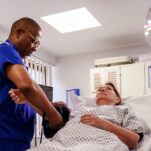Why Might You Need DC Cardioversion?
Your cardiologist may recommend DC cardioversion if you have:
- Persistent or symptomatic atrial fibrillation
- An arrhythmia that hasn’t responded to medication
- Difficulty breathing, fatigue, or palpitations due to irregular heartbeat
- Increased risk of stroke or heart failure from ongoing rhythm issues
What to Expect During the Procedure
- Preparation – You may need to take blood thinners before the procedure to reduce the risk of stroke. A transoesophageal echocardiogram (TOE) may be done beforehand to check for clots.
- Sedation – You’ll receive a short-acting sedative or anaesthesia to ensure comfort.
- Electrical Shock – Patches (electrodes) are placed on the chest, and a quick, low-energy shock is delivered.
- Monitoring – Your heart rhythm is monitored to confirm normal rhythm is restored.
- Recovery – The procedure takes only a few minutes, and most patients go home the same day.
Benefits of DC Cardioversion
- Rapid restoration of a normal heart rhythm
- Relief from symptoms like palpitations, breathlessness, and fatigue
- Reduces long-term risk of complications from atrial fibrillation
- Performed safely under sedation with experienced cardiac teams
- Can improve quality of life and cardiac function
Aftercare and Follow-Up
Following DC cardioversion, your doctor may recommend:
- Continued use of blood thinners (e.g. warfarin, DOACs)
- Heart rhythm medications to maintain sinus rhythm
- Follow-up ECG or echocardiogram to assess treatment success
- Lifestyle adjustments and risk factor management (blood pressure, sleep apnoea, alcohol)
How to pay
You can self fund treatment, or pay through your medical insurance:
For those with an insurance policy which covers gastroscopy (many do).
For people choosing to fund their own diagnosis and treatment.
Why Choose Royal Buckinghamshire Hospital for DC Cardioversion?
Led by experienced consultant cardiologists, our service offers fast access to treatment, advanced cardiac facilities, and exceptional patient support.






